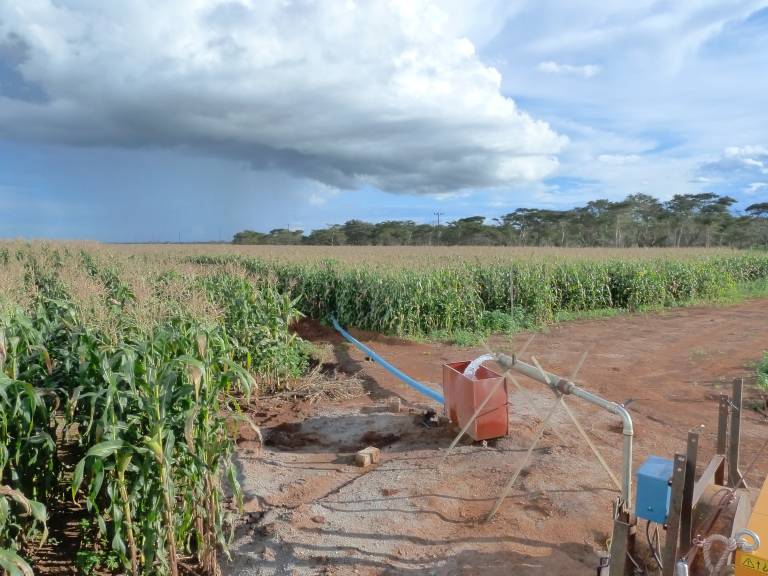Student blog - Inaugural Lecture | Surviving the Anthropocene: the role of groundwater
21 October 2019
Written by Isabelle Colvin, BSc Geography student, UCL Geography

Richard Taylor is Professor of Hydrogeology here at UCL. If you studied the Geography module titled Human Ecology in first year, you probably recognise his name. But Taylor’s lecture on Tuesday 15 October – part of the 2019/20 inaugural lecture series for UCL's Faculty of Arts & Humanities and Faculty of Social & Historical Sciences – was not aimed just at Geography freshers.
Through carefully integrated terminology and subtle use of data and images, Taylor smoothly made his lecture on the Anthropocene – and the importance of groundwater – accessible to those with no prior knowledge of the subject matter.
If you didn’t attend his lecture, you missed out. But all is not lost…Read on for a bite-sized recap of Surviving the Anthropocene: the role of groundwater.
- What is the Anthropocene?
Put simply, the Anthropocene is the epoch that we are currently living in: an ongoing age in which, Taylor states, “human activity is the dominant influence on our climate and environment.”
Whilst the start of the Anthropocene is still widely debated (some argue it began in 1610, whilst others maintain 1964 as the onset), we know at least two things for certain:
- It is current
- It is caused by us
- How have we caused it?
In his lecture, Taylor highlighted four key ways in which human activity influences the world around us:
- Rapid population growth
- Land-use change
- Pollution (NB: save the turtles!)
- Global warming
Through these actions, humans have radically reshaped the Earth’s surface. As Taylor concluded bluntly: “there is no getting out of the fact that we are responsible for climate change.”
- But how does groundwater tie into all of this?
Groundwater refers to water that is stored underground in soil, or in pores and crevices of rock.
Remember how land-use change is a key characteristic of the Anthropocene? Well, through the conversion of natural grassland (like the Sahel’s savannah) into crops such as millet, humans are interfering significantly with the water cycle. This is because crops require irrigation – which leads to consumptive use of freshwater and, in turn, depletion of groundwater supplies.
In 2014, Taylor and his team began their studies of groundwater, focussing their work primarily in East Africa. Upon discussion with Ethiopian farmers about water sources and uses, Taylor realised that many were blind to where their water comes from and how exactly it is used.
They were not aware of the extent to which their traditional agricultural practises were significantly changing the climate by shifting natural water balances.
- What do we do next?
When you consider how limited their access to resources is, it is less surprising that the Ethiopian farmers lacked knowledge regarding the context of their water supplies. Particularly amongst less economically developed populations, resources are controlled by what Taylor referred to as “a complex web of political, cultural and economic factors.”
So surely, we - the more economically developed population, with access to resources such as technology and education - should be taking action to combat climate change?
Well, attempts are being made on scales ranging from local to global. Taylor highlighted the UN Sustainable Development Goals as a prominent example: seventeen goals which target a range of global issues such as poor sanitation and malnutrition, with the ultimate aims of promoting global prosperity and eradicating extreme poverty. You can learn more about the SDGs simply through a quick online search. But be warned: Taylor described them as “rather elusive to achieve.”
Perhaps instead, Taylor emphasizes, we should focus on the ways in which groundwater can help us survive the changing global climate: naturally distributed groundwater can play a key role in supporting human adaptation to the changes that characterise the Anthropocene. For example, allowing intensified rainfall to be absorbed naturally into soil, or even enabling better distribution of rainfall through the introduction of hand-dug wells and channels, promotes groundwater recharge and reduces unnecessary freshwater consumption.
For the above reasons, I would suggest following the sage advice that Taylor concluded his lecture with:
“If you want to survive the Anthropocene, dig or drill a well.”
Listen to Richard's lecture:
Inaugural Lecture Series 2019/20
This lecture is part of the 2019/20 series for UCL's Faculty of Arts & Humanities and Faculty of Social & Historical Sciences. The series provides an opportunity to recognise and celebrate the achievements of our professors who are undertaking research and scholarship of international significance, and offers an insight into the strength and vitality of the arts, humanities and social sciences at UCL.
All our lectures are free to attend and open to all. You don't have to be a UCL staff member or student to come along.
Lectures begin at 18:30 and are typically one hour long. A drinks reception will follow, to which everyone is welcome to join.
We look forward to meeting you at one of our events.
For information on other upcoming lectures please visit: https://www.ucl.ac.uk/social-historical-sciences/news-events/inaugural-lectures
 Close
Close

